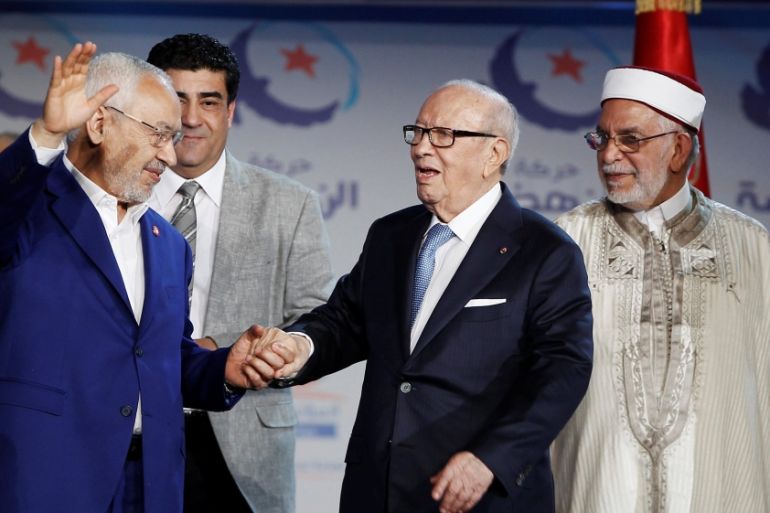Why is Tunisia’s Ennahda ditching political Islam?
Several months of internal debates have come to full fruition for the reformists within the party.

Tunis – Is Tunisia’s Ennahda party renouncing ‘Islamism’, its doctrinaire sine qua non and the basis of its foundational identity?
Over a three-day congress, the party’s first since 2012, members discussed the question through heated but pluralist debates. Ennahda, a movement that emerged in the late 1970s as a national political party with an Islamic frame of reference, is now committing to separate the religious (al-da’awi ) from the political (al-siyasi).
A vision that was upheld for more than three decades has ceded to a new brand of civic Islamism. That is, by analogy, a neo-Ennahda has not only edged closer to the notion of a civil state, but also to Turkey’s ruling AK Party and further from Egypt’s standard Muslim Brotherhood or “Ikhwani” model: The former operates politics with minimum ideology, the latter has historically harboured ambitions of Islamising polity.
This is why in one of his interventions during the congress, the party’s president, Sheikh Rachid Ghannouchi, was adopting a new discourse angled at stressing the primacy of the market, economic growth, renouncing the politics of identity, very much part of the fundamentals of his thought for more than 30 years.
READ MORE – Tunisia: A revolution besieged by ISIL
But why is Ennahda renouncing political Islam?
|
The shift is intended also to pre-empt criticisms from liberals and secularists that it does respect Tunisia’s political identity. Ennahda can now claim it is transcending politics of identity. |
First, one of the reasons is the normalisation of Ennahda party with the ‘deep state’, a term coined to refer to the politico-security establishment that has preserved the imprints of late Tunisian President Habib Bourguiba’s political modelling of it a la Francophile: secular in nature.
Tunisia’s society is similarly shaped, manifesting a deeply hybrid personality that reveres Islam but with a bent for civic engagement of all aspects of the horizontal side of life, including politics.
Ennahda is finally being deftly adaptive, seeking a brand of “Tunisification” of its identity as a major political force with a fixed 35 to 40 percent political following.
A second motive for Ennahda is professionalisation. So by defending a new identity that separates the religious from the political, Ennahda has turned an important corner on the way to a fully-fledged civic political party.
The amendments that have all been passed with an absolute majority – 800-plus votes by the conferences – all prove that several months of internal debates have come to full fruition for the reformists within the party.
This includes further empowerment of the party’s Shura Council, of which 100 representatives are directly elected by the conferences, and another 50 by the Council’s elected 100 representatives. Ennahda’s partnering in the troika government, that delivered the country’s democratic constitution in early 2014, provided the party with an invaluable “reality check”, which it used to reflect, revise and adjust.
READ MORE – Q&A: Tunisia’s social time bomb
Third, democratisation via factionalisation: This is a salient feature of maturing political parties anywhere.
|
|
One of the most fascinating debates and the first ever in the history of the Ennahda party took place on the morning of May 22. Three leaders, representative of first and second generations of the movement, took to the floor to openly contest and defend their respective views of how the party should be internally organised, led, and administered .
This was unthinkable before the 2011 revolution in Tunisia. Ennahda’s practice of internal democracy has produced a kind of factionalisation, but this in itself is not a bad thing. Perhaps there are ideological factors.
Distinguishing between the fixed (al-thabit) and the mutable (al-mutaghiyr) is one factor that may explain the shift. Politics belongs to the sphere of the changing. There is a question of public utility or “maqasidi framework” at play as well.
Exigencies and necessities of the Tunisian context have influenced this move. Religiously inspired actors in the Muslim world are trying to define themselves in opposition to the likes of ISIL. Ennahda is no exception, with a narrative pitting “moderates” versus “radicals”.
In the Tunisian national milieu, Ennahda is probably responding to the misgivings of its detractors that it is hiding a secret theocratic agenda: That once in power it will impose dictatorship.
The shift is intended also to pre-empt criticisms from liberals and secularists that it does respect Tunisia’s political identity. Ennahda can now claim it is transcending politics of identity.